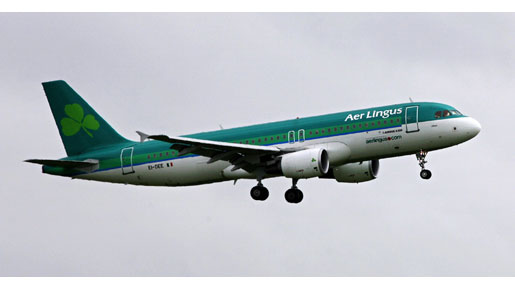
There are few crumbs of comfort about for most Aer Lingus staff these days. The troubled airliner is slashing almost 700 jobs in the next two years – equivalent to almost 20 percent of its total workforce – in an effort to shave €74m from its payroll bill, estimated to be around €300m. Failing this, a raft of compulsory redundancies are almost certainly likely in an effort to make ends meet.
It’s a huge challenge for Aer Lingus’ new CEO Chrisoph Mueller. Mueller was dropped into the top job at the start of October. Formerly the aviation boss of TUI travel, he’s had plenty of experience in the aviation business with senior position spells at Lufthansa AG, Daimler Benz Aerospace and the Sabena Group. He’s also, needless to say, a highly experienced bean counter.
Mueller’s career commenced deep within the confines of Lufthansa’s group auditing department before moving onto Daimler Benz Group as financial director with Deutsche Airbus. He’s held several board positions with a spread of aviation and travel companies. He’s also highly skilled at the strategic partnership that may come in handy with Aer Lingus: during his tenure at TUI Travel he orchestrated a strategic partnership with Air Berlin slashing several unprofitable routes. But he’s never had to face down unions and staff on this scale before.
Burning fuel
Mueller’s wide experience of the travel industry is undisputed. But today’s airline industry is a very different beast to what it was even five years ago with falling fuel prices, lower passenger demand not to mention more travel and environmental taxes being imposed from several directions. Much of Aer Lingus’s current losses and troubles are attributed to its long-haul operations.
“Primarily the additional cuts will come on the long-haul network…we will be announcing that we are taking a further aircraft out of the business on long haul,” Sean Coyle, Aer Lingus’ financial director told state broadcaster RTE recently. “Our capacity to survive, if we can control our cash base, is there. Hopefully if we can get these changes through, the company will have ceased its cash burn.”
Traditionally many airline companies traditionally rake in the cash during the spring and summer in an effort to build up resources to get them through the quieter winter months when passenger numbers are sharply down. But because of the recession, passenger load numbers have dwindled this summer leaving Aer Lingus’ cash store – alongside other airliner company resources – pretty depleted.
Stablising airspeed and ending freebies
What, then, will Mueller’s strategy be to stave off bankruptcy? His key move has to be stabilising the airline. Crucial to this says Mueller (who earns himself a basic salary of €475,000 plus share options and other perks, said to be worth €4m over four years) is taking a hard look at its defined-benefit pension scheme – a huge drain on resources – which Mueller and Coyle claim is simply unsustainable long term. There have been no major air safety incidents but there is concern – from pilots across several European airline operations – that longer working hours could be putting lives at risk and Aer Lingus, like its competitors, will have to get the balance right here as new cost-cutting working methods are introduced.
One big unknown though is just how big a role Ryanair will play in the come-back. Ryanair already holds a 29 percent stake in the airline. “If they continue down this road of constant restructuring programmes,” Ryanair chief Michael O’Leary told RTE recently, “constant job cuts and no growth the government will ultimately be forced to come to Ryanair and ask it to rescue it.” Anti-competition rules has previously held O’Leary back but buying Aer Lingus could also be a vehicle for him to buy BMI and its valuable landing slots at Heathrow.
Certainly Aer Lingus has struggled to compete with Europe’s largest budget airline (and probably the most cost-efficient player in the industry today). What doesn’t help it though is the legacy culture it is lumbered with.
A good example are the free flights offered to former directors. Recently Aer Lingus confirmed that the loss-making airliner was continuing to offer free flights to ex directors like Dermot Mannion despite its parlous financial position. These kind of freebies are shunned by carriers like Easyjet and Ryanair. Even Stelios Haji-Ioannou pays for his own flights. It wouldn’t make him popular at top table to put a stop to Aer Lingus’ so-called Golden Circle freebie culture but it would show Mueller’s staff and the Irish government (still part owned by the Irish tax payer) that he’s serious about change.
Silver cloud linings?
Are there any silver linings at all for the airliner? Well, total passenger numbers climbed 4.1 percent to 960,000 in September while the number of short haul passengers climbed 7.4 percent to 874,000. The recent news of cost-cutting by Mueller helped this flag carrier’s share price, which gained almost eight percent to €0.77.
However long haul passengers saw a 20 percent cut falling to 86,000 – and long-haul is where meaty profits are. Premium-class trade to the US this year tumbled by 30 percent in the first half of the year and some long-haul flights were said to be flying at just 30 percent capacity.
Not good. Analysts meanwhile are predicting a full-year operating deficit of €120-€150m. Off-the record comments by Mueller himself suggests that the troubled airline company has a fifty-fifty chance of survival. If the current recession continues to bite, the odds worsen. The scenario is equally bleak if unions and staff attempt to fight the changes and strike, which would be hugely damaging for a company almost on its knees as it is. But just about everyone in the industry – at least those who take an objective view of the company – knows Mueller has to operate a slash-and-burn strategy if the company is to survive. It’s slash-and-burn, or crash-and-burn.

